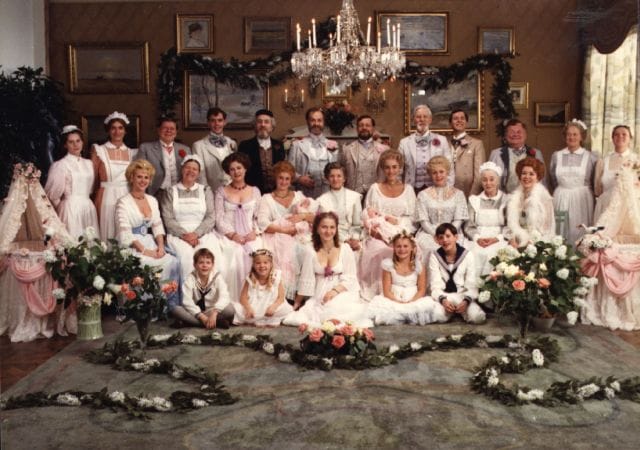Episodes: Why don't American TV critics talk about foreign TV more?

Of all the questions people ask of American TV critics, there's one that's become harder and harder to grapple with over the years: Why do we treat so much foreign TV as a curiosity? When we're making lists of the best TV shows of all time, why are they so American-centric, and why don't they include stuff like Berlin Alexanderplatz or Fanny and Alexander? Yes, those projects made it to the US as feature films, initially, but since we have access to the TV miniseries versions of both now, shouldn't they qualify just as easily as, say, Roots might?
(There's also a corollary to this, which is: Why don't you cover foreign TV on the schedule at which it airs overseas? Fortunately, the answer to this one is easy: The vast majority of our readership -- like 99.99 percent -- is only going to catch up with the program when it's legally available in the US. Both of the sites I've written for have heavy international readership, but not so heavy as to make up for the fact that, say, US viewers won't get to watch the final season of Downton Abbey for months.)
But to return to that first question, the simple answer is "I don't really know, even as I largely adhere to these same guidelines." But the more complicated answer is "American TV criticism developed as a method of critiquing American TV, which is a unique and distinct enough art form as to be essentially different from something like Fanny and Alexander."
Think about it this way: A novel is a novel anywhere it's published, and a movie is a movie. But an open-ended, multiple-season TV show that runs for over 100 episodes (or even over 50 episodes) is pretty much an American invention. You can find shows that adhere to some of those qualities overseas (like there are K-dramas that run for many, many episodes but are also close-ended stories), but it's really only in the US that you could find that exact set of qualities for the vast majority of TV history.
(Another tangent: This is, I think, why Doctor Who has always found a bit of a foothold in the States. Of all the British shows, it's the one that most superficially resembles an American one on some structural level, even as it's perhaps the ultimate British expression.)
Perhaps the best example of this is to talk about how most American TV critics talk about American shows that don't fit that set of specifications above, which is to say that we mostly don't. Sure, we write about the absolute standouts, like, say, Last Week Tonight with John Oliver or Olive Kitteridge, but when it comes time to draw up year-end lists or offer our highest praises, we usually skew toward scripted drama and comedy, because that's what the form is inherently set up to discuss. So foreign series are treated similarly: We write glowing things about the standouts, mostly ignore the rest of it, and then forget about it when it comes time to start rounding up superlatives.
Most foreign shows are either miniseries or short, short, short-run orders that are lucky if they last 20 episodes. And we just don't know what to do with either of those things, outside of saying it was good or bad. I wrote earlier that most TV critics (or at least a lot I've known) are, on some level, people who get deep into the structural rhythms of a TV show, and that's really only possible if you have enough episodes to establish those rhythms. Foreign TV can be brilliant, particularly on a directorial level, but the system isn't set up to notice that.
If there was a time when American TV criticism was structurally set up to support the best of foreign TV, it was probably in the 1970s (and, indeed, that was the era of Upstairs Downstairs being regularly proclaimed the best show on TV). At that point in time, it looked like the miniseries was going to be the next big thing, and that allowed for a slow, steady influx of British dramas. But when it came to non-English-language TV, there was essentially no access, which meant that when things snapped back to the usual pattern in the '80s, there was no real tandem critical movement.
(A final sidebar: Also, a lot of TV people are still a little worked up about not being film people, both within the industry and within criticism. That's changed in the last 10-15 years, but it drives a lot of the idea, I think, that a film director making a major miniseries doesn't count as "real" television.)
It doesn't necessarily have to be this way, I don't think, and you're already starting to see some of the barriers coming down, thanks to the seismic impact of streaming and video on-demand. Black Mirror turned into a sensation on these shores, and I'm surprised how many people I know to be casual TV fans are super-psyched for the return of The Returned (or, as our French friends know it, Les Revenants). The old walls are starting to break down, so I expect these will, too.
But I'm also a little sad about what will be lost. The long-running American TV series is essentially a recipe for eventual artistic failure, but it's always fun to watch shows outrun their own obsolescence. Now that we're increasingly buying the idea that shorter episode runs, with close-ended premises, makes for better TV (which it often does), we're losing that frantic attempt to stay ahead of the giant boulder about to crush everyone. American TV is a different thing from the TV of most other nations. Not better, just different. And that's still worth appreciating.
--
A call for reader requests: I'm going to spend next week talking about scary TV episodes, ideally ones I've never seen. Please email (by replying to this email) or Tweet me with your nominations! (To help you out, yes, I've seen every Twilight Zone, X-Files, and Buffy.)
--
Episodes is published daily, Monday through Friday, unless I don't feel like it. It is mostly about television, except when it's not. Suggest topics for future installments via email or on Twitter. Read more of my work at Vox Dot Com.




